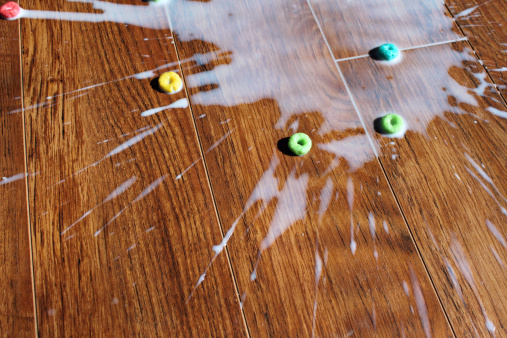A child's mind is filled with so much imagination and fantasy their eyes glisten when they hear a story or watch a movie that they connect with. Then you end up reading that story or watching that movie 4 or 5 times a day!
So it shouldn't be surprising when a bit of their imagination spills over into reality. Telling a fib is not unusual for a child to explore the boundaries between reality and fantasy.
 |
| Credit |
An example can be when a parent who asks their 3 year old if they were
the ones who “spilled the milk on the floor” can find it frustrating to hear “it
wasn't me, my superhero doll did it.” It's easy to assume that your little toddler has learned to lie when you know
it was them who knocked over the milk that you have to clean up again!
When should the concept of "lying" be addressed to a toddler? And how do you explain lying and truthfulness in a way they can understand?
What the experts have to say
Pediatric psychologist Mark
Bowers explains that children under the age of 5 are not “future criminals”
because they didn't confess being the one who spilled milk in the kitchen. They are too
young to understand what a lie is.
What are ways to encourage
truthfulness in young children according to Bowers?
You can lay down the rules. If you catch your child drawing
on the walls,sometimes your first instinct is to confront them. Chances are
when you do they will say “no” because they don’t want to get in trouble. It is more effective to remind them of the rule and offer a solution.
For
Example: "We have a rule in this house that we only
draw on paper. So why don't we get some soap and you can help Daddy clean it
up."
Here are more tips from Developmental Psychologist Susanne Ayers Denham to help your children practice
truthfulness.
* Encourage
honesty. Instead of
coming down hard on him when he lies, thank your toddler when he's being direct
and tells the truth. You might say: "That's great that you told me about
the broken truck. Now I understand how it got that way."
* Avoid putting your child on the spot. Try not to question him about the details of a transgression. After all, in many cases it's patently obvious; if he has chocolate all over his face, you know exactly what happened to his sister's candy. Often we question young children because we want them to confess, but this can create a battle where there doesn't need to be one.
* Act on what you know. In a matter-of-fact way, say, "Gee, Justin, it's not okay to take some of Becky's candies. They're hers and it upsets her to lose them. Let's give her some of yours, okay?" By taking this tack, not only have you circumvented the "confess-you-are-lying" confrontation, but you've also led him through the process of reparation. In the long run, knowing how to make up is a more useful skill than knowing how to respond to an interrogation.
* Model trust. Show your toddler that you trust him and he can trust you by always telling him the truth. Make it a priority to keep your word, and apologize profusely if you break a promise. He'll learn more from your behavior than he ever could from your admonitions.
 |
| Photo Credit |

No comments:
Post a Comment
Note: Only a member of this blog may post a comment.